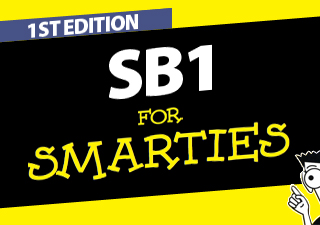Fact Sheet

SB1 for Smarties
Not sure how Senate Billl 1 will affect you, the taxpayer or parent? Here are some important things you need to know!
Does SB1 contain a hidden “Voucher Tax?” No and most emphatically, NO! Despite recent attempts by desperate special interests that have spent tens of thousands on commercials and web sites full of misinformation, SB1 simply contains no such tax. In fact, school choice doesn’t cost any more money, period. Indeed, both the new voucher program and the expanded EITC account for 0.5 percent of total public school spending. This means that 99.5 percent of the current $26 billion we spend on public education stays in the public school system with no new taxes!
Will SB1 force school districts to raise taxes or reduce funding for local schools? NO. In fact, school districts should be more capable of lowering their taxes. Here’s why: The Harrisburg School District spends approximately $17,675 per student. Under SB1, a low-income student trapped in a chronically underperforming school would be eligible to utilize a state-funded voucher of approximately $8,828 to attend an alternative public or private school. Where does the remaining $8,847 go? It stays in the district effectively increasing the amount of money per student for the remaining children and giving school boards options they don’t currently enjoy. They could start paying for the unfunded teacher pensions that are soon to skyrocket or even choose to reduce the current taxpayer burden.
Is SB1 Constitutional? Yes. Pennsylvania case law permits the transfer of funds to parents for the purposes of exercising school choice. In other words, because scholarships are given to parents who then make school choices, the money is not being given directly to private schools. The Pennsylvania State Constitution states, “No money raised for the support of the public schools of the Commonwealth shall be appropriated to or used for the support of any sectarian school.” State General Fund revenue does not meet this definition as it is not raised for the purposes of funding public education. School district property taxes are raised for this purpose and that is why SB1 involves only state funding for private schools, and not local tax property revenue.
Will SB1 force cuts to music, arts and sports programs? Not even a little bit. How a district spends its money is still up to the district – SB1 does not mandate cuts to these programs. But let’s remember something most important here: It’s about the kids and about their education. Children currently trapped in failing and often violent public schools aren’t in need of tuba or tennis lessons, they are in need of a safer and more capable environment in which to learn the skills to be successful in life.
Will SB1 add millions to long-term state debt? No – there is absolutely $0 borrowed in SB1, which adds $0 to PA long-term debt! Pennsylvania taxpayers currently pay $26 billion per year, up from $16 billion in 2002, to fund the public school system – an increase of 56 percent while inflation was just 18 percent.
Is SB1 really wealth redistribution or a new entitlement? The question is not whether we “redistribute wealth” but how best to provide a thorough system of education. Do we want to continue to prop up the existing public school system, or move to a system that delivers better education at lower costs to taxpayers. By giving parents greater control, SB 1 will improve the quality of education delivered – as nearly every study of school choice indicates. And SB 1 improves the efficiency of how we spend taxpayer dollars, as vouchers and EITC scholarship education children for substantially less than the $13,000 per pupil average our school districts spend today.